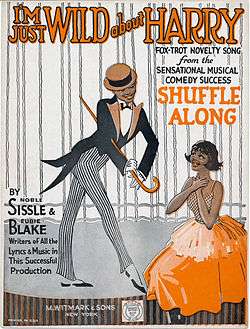Noble Sissle

Noble Lee Sissle (July 10, 1889 in Indianapolis, Indiana – December 17, 1975 in Tampa, Florida) was an African-American jazz composer, lyricist, bandleader, singer, and playwright, best known for the Broadway musical Shuffle Along (1921), and its hit song I'm Just Wild About Harry.
 |
I'm Just Wild About Harry
|
| Problems playing this file? See media help. | |

Early life
Sissle was born in Indianapolis, Indiana on July 10, 1889, around the time his father Rev. George A. Sissle was pastor of the city's Simpson M. E. Chapel.[1] His mother, Martha Angeline (née Scott) Sissle, was a school teacher and juvenile probation officer.[1]
As a youth Sissle sang in church choirs and as a soloist with his high school's glee club in Cleveland, Ohio.[2] Sissle attended De Pauw University in Greencastle, Indiana on scholarship and later transferred to Butler University in Indianapolis before turning to music full-time.[3]
Career

On October 1, 1918 Sissle joined the New York 369th Infantry Regiment[1][4] at New York City where he helped Lieutenant James Reese Europe form the 369th Regimental Band. Sissle played violin and also served as drum major for the 369th that, under Europe as bandmaster,[1] performed to great acclaim. He sang several vocals on the last disc recorded by the band that was released in March 1919. He left the army after the war as a second lieutenant with the 370th Infantry Regiment[4] and joined Europe’s civilian version of the 369th band.
Not long afterwards, on May 9, 1919 James Europe was murdered by a disgruntled band member in Boston, Massachusetts, leaving Sissle, with the help of his friend, songwriter Eubie Blake, to take temporary charge of Europe's band. Years earlier Sissle had struck up a partnership with Blake after they first met in Baltimore in 1915[5] and had remained in touch during the war. Sissle is noted for his collaborations with Blake. The pair first performed in vaudeville and later produced the musicals Shuffle Along and The Chocolate Dandies. Sissle is also, famously, the only African-American artist to appear in the Pathé film archives.
Shortly after World War I, Sissle joined forces with Blake to form a vaudeville music duo, "The Dixie Duo". After vaudeville, the pair began work on the jazz musical revue Shuffle Along, which incorporated many songs they had written, and had a book written by F. E. Miller and Aubrey Lyles. When it premiered in 1921, Shuffle Along became the first hit musical on Broadway written by and about African Americans. The musicals also introduced hit songs such as "I'm Just Wild About Harry" and "Love Will Find a Way".[6][7]
In 1923 Sissle made two films for Lee DeForest in DeForest's Phonofilm sound-on-film process. They were Noble Sissle and Eubie Blake featuring Sissle and Blake's song "Affectionate Dan", and Sissle and Blake Sing Snappy Songs featuring "Sons of Old Black Joe" and "My Swanee Home". Blake made a third film in Phonofilm, playing his composition "Fantasy on Swanee River". These three films are preserved in the Maurice Zouary film collection at the Library of Congress.
Sissle and his band appear in a 1930 British Pathétone short filmed at Ciro's nightclub in London, performing Walter Donaldson's "Little White Lies" and "Happy Feet", written by Jack Yellen and Milton Ager. In 1932, Sissle appeared with Nina Mae McKinney, the Nicholas Brothers, and Eubie Blake in Pie, Pie Blackbird, a Vitaphone short released by Warner Brothers. In February 1931, Sissle accompanied Adelaide Hall on piano at the prestigious Palace Theatre (Broadway) in New York during her 1931-32 world tour.[8]
In 1954, New York radio station WMGM, which was then owned by Loew's Theatre Organization, signed Sissle as a disc jockey. His show featured the music of African-American recording artists.[9] Sissle was a member of Alpha Phi Alpha fraternity.
Death and legacy
Sissle died in 1975 at the age of 86 in Tampa, Florida. His rendition of the song "Viper Mad" was included in the Woody Allen film Sweet and Lowdown.
See also
References
- Notes
- 1 2 3 4 Reef (2010)
- ↑ Gates, Henry Louis; Appiah, Kwame Anthony, eds. (1999). Africana: Arts and Letters: An A-to-Z Reference of Writers, Musicians, and Artists of the African American Experience. Basic Civitas Books. ISBN 978-0465000715.
- ↑ Badger, Reid (1995). Life in Ragtime: a biography of James Reese Europe. Oxford University Press. ISBN 978-0195060447.
- 1 2 National Cemetery Administration. U.S. Veterans Gravesites, ca.1775-2006[database on-line]. Provo, Utah, USA: Ancestry.com Operations Inc, 2006.
- ↑ Ebony, July 1973
- ↑ Southern, Eileen (2002). Kernfeld, Barry, ed. "Eubie Blake". The New Grove Dictionary of Jazz (2nd ed.). London, UK: MacMillan. 1: 231.
- ↑ Graziano, John (2002). Kernfeld, Barry, ed. "Noble Sissle". The New Grove Dictionary of Jazz (2nd ed.). London, UK: MacMillan. 3: 596.
- ↑ Williams, Iain Cameron (2002). Underneath a Harlem Moon: The Harlem to Paris Years of Adelaide Hall. Continuum. pp. 389, 395. ISBN 0826458939.
1931-Adelaide Hall appears four times at the Palace Theatre (Broadway) during her 1931-32 world tour - February (with Noble Sissle), April, July & November
- ↑ "Noble Sissle to D.J. Platter Show". Billboard. Nielsen Business Media, Inc. January 16, 1954. ISSN 0006-2510.
- Bibliography
- Reef, Catherine (2010). African Americans in the Military. New York City, New York: Facts on File, Inc. ISBN 978-1-4381-3096-5.
- Fuld, James J. (2012). The Book of World Famous Music, Classical, Popular and Folk (5th ed.). Dover Books. ISBN 978-0486414751.
External links
| Wikisource has original text related to this article: |
| Wikimedia Commons has media related to Noble Sissle. |
- Noble Sissle and Eubie Blake at Jass.com
- Noble Sissle at Internet Broadway Database
- Noble Sissle at Internet Movie Database
- Sissle and Blake Sing Snappy Songs (1923) sound film made in DeForest Phonofilm on YouTube